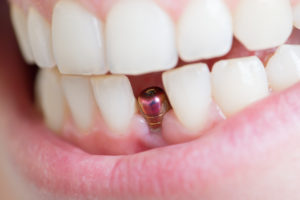 Dental implants enjoy a very high success rate — they thrive in well over 90 percent of patients. However, it’s a sad fact that sometimes these tooth replacements don’t live up to expectations. It may be because of infection, a patient’s health conditions, or other factors. But how can you tell if you need to seek treatment for a failing dental implant in Dallas? Here are some signs to watch out for.
Dental implants enjoy a very high success rate — they thrive in well over 90 percent of patients. However, it’s a sad fact that sometimes these tooth replacements don’t live up to expectations. It may be because of infection, a patient’s health conditions, or other factors. But how can you tell if you need to seek treatment for a failing dental implant in Dallas? Here are some signs to watch out for.
Severe Pain
It’s normal to experience some mild discomfort after your implant surgery; after all, the dentist just drilled into your bone. It’s usually easy to manage this type of pain with medication and by taking reasonable measures not to irritate the surgical site.
However, if you are in severe pain any time after the surgical site has healed, it is a warning sign that something may be wrong with the implant.
Peri-Implantitis
Peri-implantitis is an infection in the gums around the implant. It can eat away at the jawbone, thereby compromising the implant’s base of support. This may happen due to a lack of good oral hygiene, but there are other potential causes as well. Some signs of peri-implantitis include:
- Gum inflammation
- Gum recession (this may become so severe that the metal part of the implant becomes exposed)
- Bleeding at the gum line
- Pus around the implants and gums
Movement
Your natural teeth are attached to your bone via ligaments, so they have the ability to move slightly when pressures is applied to them. Implants, however, bond directly with the bone — they should not move at all. Movement may indicate that the bone around the implant has deteriorated.
Treating Implant Failure
It’s often possible to prevent implant failure via good oral hygiene practices and regular checkups with your implant dentist. However, despite your best efforts, you might still experience problems. If you notice that something seems amiss with your implants, you should not hesitate to make an appointment with your oral surgeon in Dallas as soon as possible. They will examine your mouth, take some X-rays, and identify the cause of the problem. If the issue hasn’t progressed too far, it might be possible to save the implant.
The treatment you receive will depend on what is causing the problem. For example, if an infection is eating away the jaw, it may be possible to get rid of the offending bacteria and then build up the bone with a graft. If the implant somehow became warped or bent, you may simply need a new implant to get your smile back on track.
Dental implants are a remarkable way to replace missing teeth, but they aren’t a fix-it-and-forget-it solution. Please stay alert for indicators of implant failure so you can seek treatment from an “oral surgeon near me” and perhaps save your precious new smile from disaster.
About the Oral Surgeon
Dr. Christopher Brown is your specialty dentist in Dallas. He has undergone extensive training in order to become a true expert in dental implants and other types of oral surgery. If you suspect that something is wrong with one of your implants, please contact our office at 972-960-1111.

